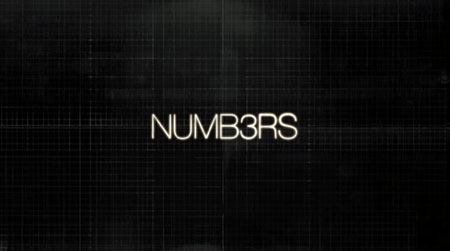
BUY IT AT AMAZON: CLICK HERE!
STUDIO: CBS/Paramount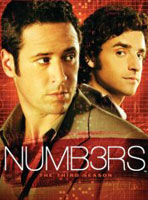 MSRP: $54.99
MSRP: $54.99
RATED: US = Nil, Canada = PG
RUNNING TIME: 24 episodes (17 hrs., 9 min.)
SPECIAL FEATURES:
• Cast and Crew Commentaries
• Crunching NUMB3RS: Season 3
• Eppes Central
• Blooper Reel
• Set House Tour*
The Pitch
It’s A Beautiful Mind meets CSI, I guess, except everyone’s nicer, except for the bad guys, who are sometimes downright villainous.
The Humans
Rob Morrow, David Vladislav Krumholtz, Diane Farr, Judd Hirsch, Alimi Ballard, Dylan Bruno (whose name is exactly as unlikely as that of his character, Colby Granger), Navi Rawat, and Peter MacNicol. (Not of potential bias: Because of the spelling of his last name, it’s possible that Peter MacNicol and I are related.)
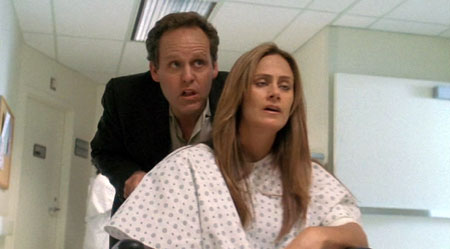
"You will like Viggo. He’s the Scourge of Carpathia.
Just, listen, whatever happens, do not mention Vermithrax, all right? Seriously."
The Nutshell
An LA-based FBI squad fights crime, succeeding only because their boss’s brother is good at math.
The Lowdown
You know what I learned? If you blow up a German half-track with Private Ryan, and you’re not Matt Damon, you get a gig on CBS. Max Martini’s on The Unit, Dylan "Enough Composition B to Blow It Twice" Bruno is on NUMB3RS. Just saying.
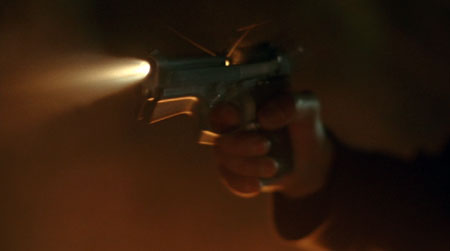
In the episode "Insert Shot," the killer turns out to be
a Second Unit Director with a grudge.
Love the show for its innocence, but hate it for its innocence. On the one hand, it’s just darling that a major network backs such a happy-yet-gritty show with a Saturday-morning premise: Solve crimes with math. On the other hand, to make that premise work, the show has to portray what should be capable, experienced crime-fighters like professional Feds as eager but outmatched holsters happy to have anybody with a Master’s degree tell them what’s what. What do all those FBI field offices without math-genius brothers nearby do to close cases?
Quick tangent: When is Agent Edgerton going to get his own show? Lou Diamond Phillips has guest starred on the show a handful of times, now, as expert tracker and top-five sniper Agent Edgerton. He comes out of the woods with a backpack and a badge, on the trail of some extremist or saboteur, and works with the FBI to secure his own brand of high-caliber, long-range justice. I’ve learned from one of this season’s audio commentaries that the character was not quite built for the obvious spin-off, but so the hell what? You can call it 5N1P3R.
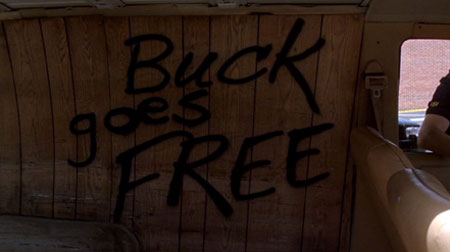
Spoiler!
Anyway, I’m overstating the problem of idiot G-Men and the Mister Wizard prodigies who do their work for them. Most of the time, the premise of the show is enough to pull us in the audience past that. Of course some mathematical breakthrough is going to give them the edge they need — it’s what this show is.
The showrunners, writers, and cast are all remarkable when it comes to selling the edutainment angle. Rather than mining the obvious TV-drama-scale conflict of brother versus brother, clashing over the right way to solve crimes ("This is my job! All right?!") while some half-drawn Chief forces them to work together, NUMB3RS plays things in a lower key. (Really, the absence of an archetypal authority figure is a relief.) The relationship between the brothers is often subdued, but almost always feels natural. It’s easy to believe these guys grew up together and have already had most of the fights. At the same time, the dynamic between the genius and the FBI is a positive one, based on a shared, genuine motivation to stop bad guys. Sparing us stale, mechanical scenes where they argue over how to do their jobs is a nice choice, and doing it means they can still get some dramatic mileage out of those scenes when they do occur, even in the third year of the show. It’s not art, but it’s fine escapism.
In the best episodes, Charlie’s mathematical insight gives the FBI team an edge that makes it possible to solve crimes faster, smarter, and more cunningly than they could without him. In the weakest episodes, Charlie’s formulas work like some kind of Star Trek plot-propulsion device, crudely pushing the story forward with a cursory reference to integers or ratios or some shit. This can be a forgivable time-saver (or pacing tool), but when it pairs up with Stupid Fed Syndrome the show becomes practically intolerable. It’s a delicate thing.
At one point, Charlie uses squawk (aircraft identification signals) to explain how he can track a plane’s doomed flight (or something.) He looks at Colby as he explains that airplanes use radios to say hello to each other, as if Colby doesn’t know about squawk. Colby was in the fucking Army! I’m a gutless civilian layabout and I know what squawk is. Can I be a professor at Cal Sci, too?
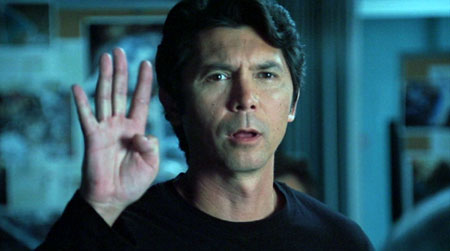
Lou Diamond Phillips negotiates his fee, in cartons of Winstons.
Oh, wait. What about: He’s an expert tracker rated as the #3 sniper in the United States. She’s a busty hacker with a secret. They fight crime. ASIST: American Sniper Investigative Service and, also, Tracking.
This show is produced by the Scott Brothers, Tony and Ridley (maybe you’ve heard of them), but I would never have guessed if not for the screen credit. The opening titles and transition graphics on the show — these textured, atmospheric effects that go a long way toward making the show feel a little bigger than TV — are the only parts that feel Scott-ish. Unless the dynamic of the Eppes brothers is based on them. In which case David Krumholtz it definitely Ridley.
What are we supposed to make of the Eppes family? In one episode, Judd Hirsch’s character faces this B-Plot obstacle: He has to refrain from making any major purchases for 30 days or he’ll lose a bet. Wait, that’s not right. Not a bet, but a friendly wager with Katherine Najimy’s character. The conflict he has to overcome later is making do with a regular, old-fashioned television when his flatscreen goes on the fritz after a month. His FBI son says, "Why don’t you just buy a new one?" The Senior Mr. Eppes’ problem is that he can’t just casually replace a new flatscreen television because of a wager? Fuck you, Mr. Eppes. Buy me a TV.
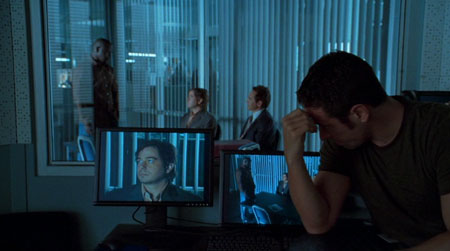
"No need to play hardball, detective. My client is willing to cooperate.
Provenza and Teri Polo brought a fresh new attitude to the show,
ending a period of needless hostility and strife.
You know it. I know it."
Seriously, though, the home life of the Eppes is such an important part of the show, but is so low-key, that I think it’s supposed to great an idyllic example of the good, free people the FBI is trying to protect. Right? We’re not supposed to relate to these happy, wealthy, healthy, (ingenious) people with the beautiful Craftsman-style home are we? The idea that we’re supposed to shake our heads and commiserate over the common household problems of having to pick up a new television on the way home from work? That idea makes me think of rich retirees, home on a Friday night, watching NUMB3RS and saying things like, "Oh, gosh," and, "My, that’s dreadful." Is that who the show’s being aimed at?
I ask because this show also features cases of murder, rape, and child pornography. But these cases are solved by math ("See, kids?!"). So just what audience is this show aiming for? Well-to-do schoolchildren at home on a Friday night, watching CBS and hating their math homework?
I think it’s that friction between dramatic formulas, network calculations, and demographic algorithms that makes the show compelling for me. All those parts don’t fit together as expected, from the pleasant relationships between the characters to the sometimes grandiose violence. Sometimes you learn something, and sometimes stuff blows up. Win-win.
Or, how about this? Edger: America Sniper-Cop
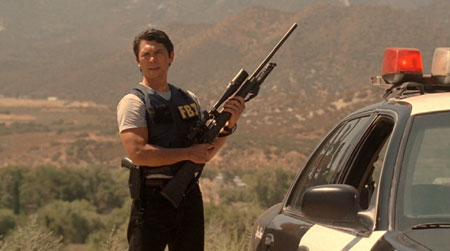
The Package
24 episodes and five flavors of extras, scattered across six discs, make this an example of the mean average of modern TV-on-DVD releases. Episodes are all letterboxed, with good color saturation and nice, artifact-light images. Special features in this set seem to dwell an awful lot on the Craftsman-style house where the Eppes live. They — the writers, producers, characters, and cast — love Craftsman-style homes. (So do I, but good lord, enough with the house.) A happy blooper real shows what a pleasant, amiable set the show is produced on, to the point of being tame. (Example: Rob Morrow quietly fumbling with his cop-harness gets a nice long take, which is funny if you like your funny dry.) Still, we’re talking about a ten-minute reel of other people having fun at work, so take that for what it’s worth.
The best thing about the package has got to be the image you get of Rob Morrow all screaming and dramatic when you slide off the plastic slipcover.
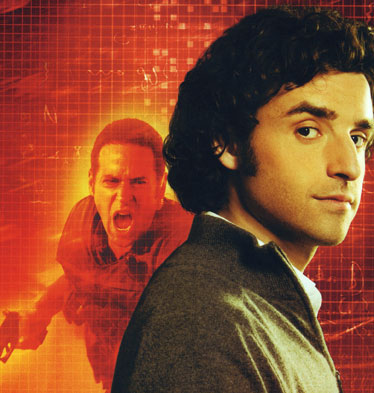
Rob Morrow’s all like, "Charlie! No! That cosine’s ready to blow!!"
But Krumholtz isn’t worried. He’s all like, "I got this hypotenuse under control."
* "Set House Tour?" What the hell is that? If it’s a tour of the house set (and it is), call it House Set Tour. Maybe use "house-set" as a compound adjective describing the tour. "Set House Tour" is an instruction, telling us to set the house tour (for, what, six o’clock?). Anyway.